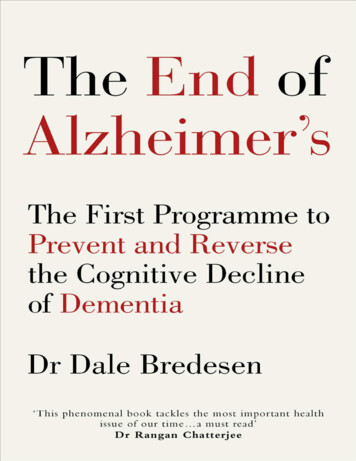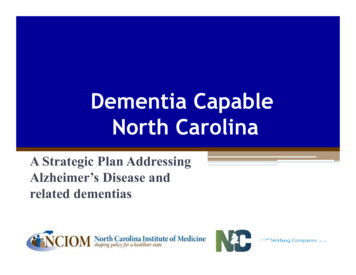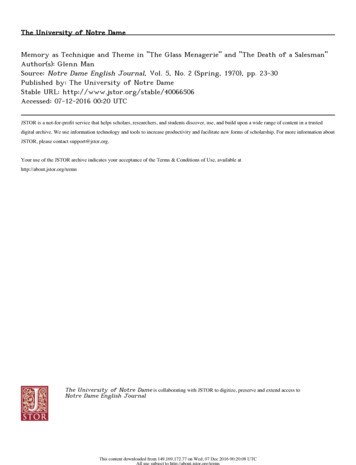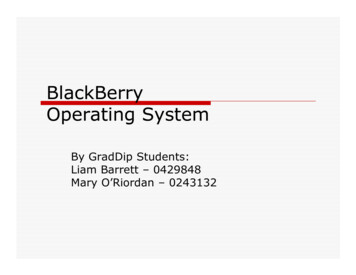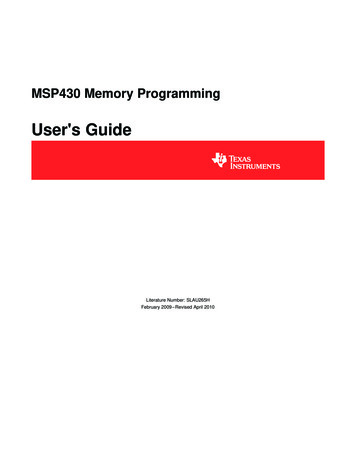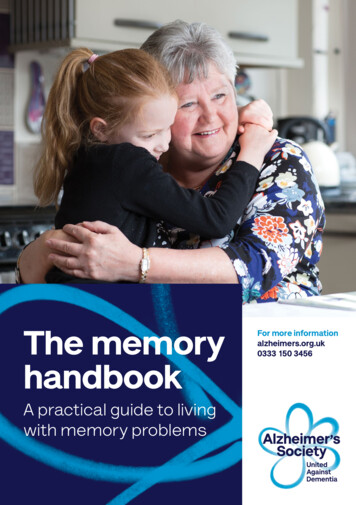
Transcription
The memoryhandbookA practical guide to livingwith memory problemsFor more informationalzheimers.org.uk0333 150 3456
About this handbookMemory loss can be frustrating and difficult to copewith. However, there are ways of managing the problemsyou’re facing. This handbook is written for people withmild memory problems. It should give you some ideasand practical strategies to help with living well.Many of the ideas in this booklet are suggestions frompeople who have problems with their memory. Everyonehas their own way of coping, and what works for one persondoes not always work for another. Use the suggestions inthis booklet to find what works for you. You might want todiscuss some of the suggestions with friends and family.If you have memory loss, you might also be having problemswith things like organising, thinking clearly, concentrating,communicating or seeing things properly. Your symptomsmay have resulted in a recent diagnosis of mild cognitiveimpairment (MCI), dementia or another condition such asdepression, or functional cognitive disorder. You may nothave a diagnosis at all, but might still be looking for ways todeal with memory problems.If you would like to talk to someone about memoryproblems, see your GP or contact Alzheimer’s Society.For information, advice and support, call us on0333 150 3456. To find out what support is available inyour area, go to alzheimers.org.uk/dementiadirectoryYou will find lots of other information about dementia onthe Society’s website at alzheimers.org.uk1
2
Contents1Understanding your memory2Coping with memory problems113Memory aids and tools194Memory strategies355Staying healthy456Services and support57Alzheimer’s Society support services64Other useful organisations6653
The memory handbook4
Understanding your memoryUnderstandingyour memoryThis section looks at the different typesof memory, how we use our senses andhow memory works.5
The memory handbookTypes of memoryMemory is a very complex thing – there are severaldifferent types. You use these different types of memorywhen you do different things. It can help to know a littleabout them.Working memoryYou use this to store information for short periods.For example, working memory is needed to rememberthe numbers when you do a sum in your head.If you have problems with your working memory you maytake longer to figure something out. For example, youmight need more time to pay at the supermarket till.Losing focusMemory loss can appear worse if you have problemswith attention. If you are not able to focus on a taskyou may not be able to keep information in yourmind. You may seem to forget, but you actually havelost focus.6
Understanding your memoryEpisodic memoryThis is needed to recall past events – recent or distant.You use episodic memory when you remember personalexperiences, such as what you had for lunch or whenyou attended a family gathering. These memories ofteninclude recalling emotions or feelings. Experiences thatcause strong positive or negative feelings are easier torecall many years later.If you are struggling to recall recent memories such aswhere you parked the car, you may have a problem withyour episodic memory.Semantic memoryYou use this to remember the meanings of words orremember facts. You also use it to remember familiarfaces or objects. This knowledge is not directly tied to anypersonal experience – for example, you may just ‘know’ aplate is for holding food or that a phone is used to talk topeople far away.If you have a problem with your semantic memory youmay have difficulty finding the right words when you aretalking to someone.Prospective memoryYou use this to remember appointments, dates or eventsthat are due to happen in the future.If you have a problem with your prospective memory youmay forget to do something at a particular time. Or youmay forget that you had planned something, such asvisiting a friend.For more help and advice call our DementiaConnect support line on 0333 150 34567
The memory handbookUsing your sensesYour memory takes in information provided by your senses.Our five senses are:SightSmellTasteTouchHearingYou can recall information stored in your memory with orwithout the help of prompts from your senses. However,a prompt can often help.Examples of promptsA photograph of someone can prompt thememory of a forgotten name or evoke anemotion (sight).A particular perfume can prompt the memoryof someone special to you (smell).The taste of a dish can prompt the memoryof when you first ate it (taste).The feeling of sand under your toes may evokememories of a childhood holiday (touch).A piece of music may bring back memories ofwhen you first met someone special to you(hearing).8For more information visitalzheimers.org.uk
Understanding your memoryTypes of memoryWhen you ‘record’ memory and then recall it, your mindgoes through this process:Receiving – You get a piece of information that is receivedthrough your five senses.Encoding – Your brain converts this information into aform that can be stored. It is held in your short-termmemory first.Storing – You transfer some of the information fromshort-term memory into the storage of long-term memory.This can take anything from a few seconds to manymonths and can be helped by repeating it over and overagain in your mind (known as ‘rehearsal’).Retrieving – You recall the information stored in yourlong-term memory.Memory problems can be caused by something goingwrong at any of these stages. The way information isstored and retrieved can be very specific to the individual.It often depends on how important the information is toyou, or if there is a strong emotion tied to the memory.Try tackling memory problems even if you sometimes findit difficult. There are ways to help improve your memoryand you may already use your own techniques forremembering things.For more help and advice call our DementiaConnect support line on 0333 150 34569
10
Coping withmemory problemsThis section helps you to understandyour difficulties with memory and looksat how you might feel about them. It alsohas suggestions for how to live well withmemory problems.11
The memory handbookTypes of memory problemsMemory problems vary from person to person. What youconsider to be a problem depends partly on what you needor expect to be able to do.Some very common memory problems include: forgetting people’s names struggling to remember day-to-day events or experiences misplacing items (such as keys or glasses) around the house getting lost in a familiar place or on a familiar journey f inding it hard to start or follow conversations forgetting appointments or important dates(such as birthdays) struggling with the steps in a recipe.12
Coping with memory problemsMemory problems and your feelingsEveryone reacts differently to memory problems.It’s normal to get frustrated or worried, or loseself-confidence.You may find the following tips helpful. Talk to others, such as friends, family or other peopleexperiencing memory problems. They might havesome helpful suggestions, and you may be able to findsolutions together. Do the things that you’re comfortable with. Start with the memory problems that are havingthe most impact on your life. For example, regularlymisplacing items like a mobile phone or keys. Try to focus on the things you can remember and can do.You may well have a good memory of events from manyyears ago. There will still be many things you are able todo that you learned in the past.‘ Try to live one day at a time and notworry what tomorrow will bring.’Person living with mild cognitive impairment (MCI)For more help and advice call our DementiaConnect support line on 0333 150 345613
The memory handbookLiving with memory problemsMany people find the following approaches helpful. It’s agood idea to try out different approaches and discoverwhich ones work best for you.Build on the skills you still haveYou will still have skills even if you have memory problems.For example, if you’ve always been an organiser andgood at planning, make the most of this when facingnew challenges.A regular routineSet up a regular daily routine. This will make it easier toremember what will happen over the course of the day.Include time to relax as part of the routine. Keep somevariety and stimulation, such as meeting up with a friendor going out to the shops, so you don’t get bored.TimingDon’t be too hard on yourself if you find something moredifficult than you used to. You could take some time outand come back to it again later, or think about differentways to manage the task. You could make a note to finishthe task as a reminder to yourself later on.Try to do the most challenging things at the time ofday when you have the most energy and can concentratebest. Avoid them if you feel tired, anxious or unwell.Take your time.14For more information visitalzheimers.org.uk
Coping with memory problemsTalk about your dayIf you’ve been out for the day, talk to your partner, or afriend or family member afterwards about it. This is agood way of remembering and feeling positive about whatyou’ve done that day.Plan aheadPlan ahead to make your daily tasks more manageable.For example, put the things you’ll need for the next daynear the front door. You could put out your bag, your keys,and your wallet or purse. This will help you to remember totake these items with you.One thing at a timeTry to do only one thing at a time. For example, if you’remaking a cup of tea, don’t make a phone call at the sametime. For a new task, repeat it and give yourself time tolearn it.15
The memory handbookSmall stepsBreak tasks down into smaller steps. Then you can focuson just one step at a time. For example, if you’re wetshaving or washing your hair, set out the things you need inorder then put each one aside once you’ve used it. Ask forhelp from others if you think you need it.One place for everythingTry to keep important items such as your keys, glasses,purse or wallet in the same place. This could be a largebowl somewhere obvious and visible (for example, by thetelephone, near the front door, or on the coffee table).Then you can always find them easily.Knowing where things areTry to keep the layout of your home familiar so that youknow where things are. Consider labelling drawers andcupboards with words or pictures of what’s inside them.Remove any clutter or unnecessary items.DistractionsIf your environment is noisy or very busy, you will find itharder to remember things or concentrate. Your memoryworks much better with no distractions. Try to makeyour environment quiet and remove any unnecessarydistractions.SupportTalk to friends and family about how you feel and how youcan work together. They can support you to try out newtechniques to help with your memory.16For more information visitalzheimers.org.uk
Your next stepsIf you have a diagnosis of dementia, it is agood idea to find out more about it, includinginformation about what treatments areavailable. Speak to your GP or see booklet 872,The dementia guide: Living well afteryour diagnosis.Talk to a family member or friend, or aprofessional such as a psychologist, abouthow you’re feeling.17
18
Memory aidsand toolsThis section suggests aids that might helpwith different types of memory problems.19
The memory handbookAids to help with memory problemsPeople with memory problems have suggested some ofthe following aids to help remember things. You might thinkof them as different tools for tackling different problems.You may have already used some of them.Look for aids that fit with the skills you already have.For example, if you have never used a reminder functionon your mobile phone, you may find it difficult to startusing it now.An occupational therapist (see page 59) can offerpractical advice. For more expensive items, you mightbe able to ‘try before you buy’ – perhaps from an‘assisted living’ shop on the high street or a disabled livingcentre. Contact your local authority for details of yournearest centre, or see the Disabled Living Foundation in‘Other useful organisations’ on page 66. If you are not ableto see a product before buying it, there might be onlinevideos which show people using and reviewing the item.Whatever aids you use, people around you can supportyou to use them.Some of the daily living aids featured in thissection are available from the Alzheimer’sSociety online shop. Visit alzheimers.org.uk/shop20
Memory aids and toolsCommon memory aidsCalendar or diaryPut a calendar, wallchart or noticeboard in a placewhere you will see it frequently – on the fridge or by thetelephone, for example. You could use a whiteboard tonote activities or tasks for the day, and wipe them off asyou do them.A notebook or large ‘week to view’ diary can be helpful.You can write down things you want to remember, suchas lists of things you need to do, or have done. Keep itsomewhere easy to see, such as by the telephone or ina fixed place in the kitchen.Get into a routine of checking a diary, calendar,noticeboard or whiteboard – perhaps when you wakeup in the morning, every mealtime, or every time youmake a drink.Cross the day’s date off your calendar before you go tobed, so that you are certain about the date when you getup the next day.Keep a journalWrite a few sentences or stick photos in a daily journal.You can look back in it to remind you what you have doneor how you felt. A journal may also give you something toshow others or to talk about. You could collect mementosof things you’ve done to add to the journal as reminders.For example, you could keep a receipt from a meal out,train tickets or a programme from an event.For more help and advice call our DementiaConnect support line on 0333 150 345621
The memory handbookCalendar clockYou could use an automatic calendar clock. As well asshowing the time, it will remind you of the date and day ofthe week.Shopping listTake a list when you go shopping. Cross things off asyou put them into your basket. If you use the same shopregularly, it can be useful to write the list in the order of theshop’s layout. A friend or family member might be able tohelp with this.At home, keep a list of items as they run out so you cankeep track of what you need.If you find it difficult to write, you could keep part of thepackaging of items you’ve run out of. Or you could use avoice recorder to help remind you what you need to buy.Contact numbersKeep a list of important and emergency contact numbersby the phone – for example, the doctor, the police,utility companies, family members or your neighbours.See page 32 for a list of useful contacts.Leave your list by the phone or store the contacts inyour mobile phone so that you have easy access to anyprofessionals you might need to get in touch with.Consider buying a phone that allows you to preprogramme your most commonly used numbers intoit. Then you would only need to press one number, or abutton with a photo on it, to call someone.22For more information visitalzheimers.org.uk
Memory aids and toolsOther useful memory aidsSticky notesYou can use sticky notes anywhere in your home to remindyou to do a one-off task.For example, you could: stick one on the freezer to remind you to take somethingout to defrost stick one on your bookshelf to remind you when youhave to return a library book.Once you have completed the task, it’s important tothrow the sticky note away. This way you won’t accidentallyremind yourself to do something you’ve already done.It also helps you to keep things tidy.Permanent remindersYou can make more permanent signs, for example alaminated A4 sheet, to remind you of things you needto do regularly.For example, you could: stick a sign to the inside of the front door to remindyou to take your keys, purse, wallet or a shopping listwith you have a sign by the sink reminding you to wash yourhands before cooking keep a sign near the bin reminding you what day toleave it out for collection.For more help and advice call our DementiaConnect support line on 0333 150 345623
The memory handbookMedication reminder boxThis is sometimes called a dosette box and has differentcompartments for each day and times of the day. Thecompartments have spaces for a number of differenttablets. With a quick look, you can see whether you havetaken your tablets for that day. Some models can be set toremind you when to take your pills, with an alarm, vibrationor flashing light.Your pharmacist can help you get a medication reminderbox and put your tablets in the right compartmentsfor you.Colour codesTry labelling or coding your keys so that each one is adifferent colour – you can buy coloured rubber key caps orrings for this. For example, your front door key could be redand your garage door could be green. If you live in a flat, thekey to your building could be blue.Electronic devicesThere are a range of electronic devices that can be usedto help with memory problems. Some of these are alsoknown as ‘assistive technology’. Many people find thatelectronic devices can help with daily tasks and supportthem to remain independent.Some devices will be easy to use, while others may takelonger to get used to. You may need the support of friends,family or professionals to help you choose one and getthe most out of it. There are benefits to using electronicdevices once you’re comfortable with them.24For more information visitalzheimers.org.uk
Memory aids and toolsSmart devices‘Smart’ devices like Amazon Echo, Google Home, andApple HomePod can help you with memory problems.These are voice-activated devices that can answerquestions or be set to notify you of tasks. For example,they can tell you the time and date if you ask, and canremind you when it is time to take medication.These devices also have more advanced features, suchas enabling you to add items to a shopping list or switchingon the TV when a programme you want to watch isstarting. You may need extra equipment for some of thesetasks, and you also need to have wireless internet (Wi-Fi) inyour home.25
The memory handbookAlarm clockUse an alarm clock, a watch with an alarm, or a kitchentimer to remind you when you need to leave the house foran appointment, or when you have to check somethingcooking in the oven.Write down why you have set the alarm, so you know why itis going off. Try to keep this reminder in a place that you’relikely to notice, such as a whiteboard, calendar or diary.Mobile phones and smartphonesMobile phones and smartphones both allow you to makecalls and send texts. Smartphones generally have manymore features, for instance being able to use email and‘apps’ (see page 29 for more information on these).There are different ways to use both types of device tohelp you: The display screen of most mobile and smartphonesshows you what day and date it is. You can also use thecalendar function to remind you of the day and date. You can set reminders on both types of device. Thismeans an alarm goes off at a certain time with amessage reminding you about something you need todo. This could be a one-off event like meeting a friendfor lunch, or a regular reminder that a TV programmeis starting, or to take medication. Some TVs or serviceproviders also have reminder features, so you can set areminder to watch or record a programme.26For more information visitalzheimers.org.uk
Memory aids and tools When you have booked a doctor or dentist appointment,for example, they may be able to send a text or emailreminder to you. Ask the receptionist about this whenyou book. Most devices have a built-in voice recorder. Use thisto record information that you need to remember.You could play it back later, or transfer reminders toa written calendar at the same time each day. Most smartphones and many mobile phones havecameras. You could take a picture of something toremind you, instead of having to write anything down. Most smartphones have the same ‘virtual assistants’that are used in the smart devices mentioned onpage 25. This means that you can ask them questions,arrange reminders, and use them in a very similar way. You can save a ‘favourites’ list when you shop online,making it easier to reorder each time.‘ The best advice is treat each day asit dawns. Don’t try and second-guesshow you think you will be, just be thebest you can be on that day!’Person living with dementiaFor more help and advice call our DementiaConnect support line on 0333 150 345627
The memory handbookComputer or tablet deviceIf you have a tablet device (such as an iPad) you can usefunctions such as reminders, notes or the calendar tohelp you.Most email accounts have calendar and to-do list featuresthat you can check.You might need to put a sticky note or label on your computerto remind you to turn it on and check your daily list.These include: calendars reminders shopping lists.28
Memory aids and toolsAppsIf you have a smartphone or tablet device there are arange of applications (known as ‘apps’) that you mightfind useful. These include electronic versions of most ofthe memory aids mentioned on page 26 as well as manyothers, such as: maps apps for life story work (a personal record ofexperiences, people and places in your life) apps for relaxation exercises and mindfulness –a technique that can help people manage theirmental health or gain more enjoyment from life.You can download apps from the internet (through a ‘store’such as the App Store or Google Play) and use them forspecific tasks. For example, you could use a medicationreminder app to prompt you to take your pills, and whichmedicine to take. Some apps will be free, while you willneed to pay for others.There are lots of different apps available and you maywant to try different ones to see if they work for you.Some apps have a free version which you can try beforebuying the full app.For more help and advice call our DementiaConnect support line on 0333 150 345629
The memory handbookPrompt and reminder devicesThese are devices that detect movement nearby andcan be placed near a door. You can set the device to playa voice message as a prompt for your memory when youapproach. For example, it could go near your front door, toremind you to lock up when you go out, or to take your keyswith you. Or you could have one near the kitchen door toremind you to check that you have switched the oven off.Other kinds of reminder devices work in a similar wayto smart devices and can automatically play a presetmessage at a certain time. For example, if you go shoppingat 9.30am on a Tuesday, you can record a messagereminding you to take your shopping list and bags with youat this time.Locator devicesYou can use these to help you find frequently mislaid itemssuch as keys or a wallet. You attach a small electronictag to the item. If you mislay it, you click a button on thelocator device to make the tag beep. You will need to keepthe locator device somewhere obvious (see ‘One place foreverything’ on page 16). Your friends and family may alsofind these useful.30For more information visitalzheimers.org.uk
HelpcardsHelpcards can make it easier to get help or assistancewhen you’re out in the community. They are the size of acredit card and are easy to carry with you. They includea box on the front for you to record what you might needhelp with, and space on the back for details of someonewho can be contacted in an emergency. To order a freehelpcard call us on 0300 303 5933 or fill out our online form– alzheimers.org.uk/form/order-free-publications31
The memory handbookA list of useful contact numbersMake a list of contact numbers and keep it near yourphone, so that you have easy access to any professionalsyou might need to get in touch with. Your list could include,for example: doctor/GP surgery community/district nurse memory assessment service or communitymental health team social services (adult social care) care agency chemist/pharmacy dentist optician occupational therapist dementia adviser others (including important personal andemergency contacts).32For more information visitalzheimers.org.uk
Your next stepsLook into the different kinds of memory aidsthat are available and see if any might workfor you.Talk to friends and family about which aidsyou might use. Plan together how you’re goingto use the aid and ask for their help. Focus onlearning to use one aid at a time.33
34
MemorystrategiesThere are many different strategies youcould try to help you cope with memoryproblems. Some of these strategiesinvolve picturing things in your mind andsome use words or rhymes.35
The memory handbookPeople remember things in different ways. This meanssome strategies will work better for some people. Try themout and see which ones work best for you.A problem-solving approachWhen applying strategies for remembering things, youmight find it helpful to follow these steps:1. Identify the problem.Example: ‘I sometimes forget people’s names.’2. Decide how much it matters to you.Example: ‘It happens a lot. It can be embarrassing’. (It maybe that some things matter a great deal, like forgettinga close friend’s name. But will it really matter much if youforget the name of a celebrity who you’re unlikely to meet?)3. Think about how you might help yourself.Example: ‘I could carry a small photo album with people’snames next to their photos or save them as contactswith photos in my mobile phone. Or I could tell peopleI’m a bit forgetful, ask for their name, and then repeatit in conversation.’ (Other examples are given on thefollowing pages).4. Practise your strategies and see what works for you.Rehearse your strategies with a close friend or partner.They can support you to learn. You will then feel moreconfident when you go out.36For more information visitalzheimers.org.uk
Memory strategiesUsing mental picturesLearning new thingsSome people can picture things and places in their mindto learn and remember: facts how to do something new how to do routine actions.How can you remembera PIN so that you canget money from a cashmachine? Imagine thenumbers making a letter orshape on the number pad:For example 1478 makesthe shape of an L.Remembering someone’s nameYou could try making a picture in your mind from somethingin the person’s name. For example: for Natasha Singh, you could imagine a girl singing for Neil Holly, you could imagine a man kneeling downand waving a piece of holly.You can have a lot of fun with these kinds of reminders.The more funny or unusual they are, the more likely youare to remember them.For more help and advice call our DementiaConnect support line on 0333 150 345637
The memory handbookYou could link the person’s most prominent feature withyour mental picture of them. Glasses, long curly hair, orsomething they often wear (such as a particular hat orjumper) could be good things to focus on.You could also try linking the person with other people whohave the same name – for example, ‘This person has thesame name as my favourite film star, Charlie.’Try these helpful tips: When picturing images in your mind, try to physicallybe in the place where you need to remember it. Practise using the image. It will help you learn andremember it. Describe or draw your images in a notebook. This willhelp you to remember them and you will have somethingto refer to if you forget some of them. Tell someone else the strategies you’re using. If you can’tremember which technique this is or how to use it, theycan prompt you.For help with remembering health professionals who visityou, you could use Alzheimer’s Society publication 923,My appointments. This provides a written record to remindyou of their names, job roles and what was discussed.38For more information visitalzheimers.org.uk
Memory strategiesJogging your memoryWorking memory (see page 6) struggles the most when itis under pressure. Calmly try the following suggestions tojog your memory in different situations:SituationStrategy for jogging your memoryYou losingsomethingat home.Try picturing yourself when youused it last and visualise whereyou put it down.You go into a roomand you’re not ableto remember whyyou went there.Try to picture where you were whenyou decided to go to the room.Retracing your footsteps in person(or in your mind) can help you torecover your train of thought.You prepare foodand you’re notable to rememberthe ingredientsyou need.Try picturing yourself cooking thefood and using all the ingredientsyou need for that particular dish.Going through the alphabet canhelp you remember names ofdifferent ingredients.39
The memory handbookUsing words and rhymesWords and rhymes can also help you to rememberpeople’s names.Try thinking of words that start with the same letteras the person’s name:Pleasant PeterFunny FionaPretty PennySmiley SunitaYou could also think of words that rhyme with theperson’s name:Tall PaulMerry TerryJolly MollyCarer SarahSome people make up their own rhymes, songs orsayings to help them remember facts and numbers.Here are some techniques people told us they use: Betty found it difficult to remember the registrationnumber of her car, which was YY51 FHT.She made up this humorous sentence:Why, Why (have I got) 51 Funny Happy Toes?40For more information visitalzheimers.org.uk
41
The memory handbookYou might be able to think of a word where the initialsstand for a set of actions you have to remember. When Jean arrived home, she had to open the front door,switch off the alarm and then press a ‘zapper’ to closethe electric garage door. She found it difficult toremember the zapper, so the garage door was oftenleft open.Jean hung a DAZ washing powder packet by her frontdoor to remind her of the procedure:DoorAlarmZapper Harry always forgot to close the front gate when he gothome. He made up the word GLO to help him remember:GateLock car doorOp
The memory handbook 6 Types of memory Memory is a very complex thing – there are several different types. You use these different types of memory when you do different things. It can help to know a little about them. Working memory You use this to store information for short p


